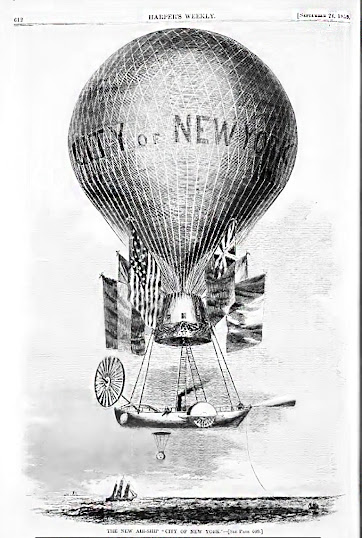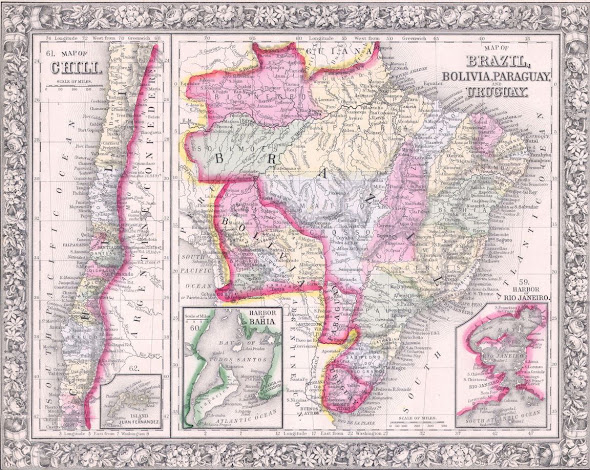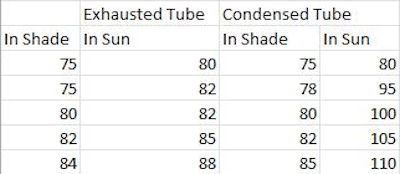Perry and the Opening of Japan--Part 1
In 1853 Commodore Matthew Perry, USN carried a letter from then President Millard Fillmore to the Emperor of Japan. The letter invited Japan to open several ports and increase trade with the United States. Japan had been closed for 220 years to all foreigners. A small group of Dutch traders residing in Nagasaki were the only contact the country had with the outside world. Fillmore made the point that the outside world had changed over the centuries and Japan could no longer afford isolation. While the tone of the President's letter was friendly, Commodore Perry's instructions were clear. He was not to take "no" for an answer. The following account of Perry's arrival in Japan was widely reprinted in American newspapers. Notice that Perry arrived in Japan on July 8, 1853 and news of the proceedings did not reach even the West coast of the US until November.
After delivering the letter, Perry told the Japanese he would return in a year for their answer. Hearing Russia, France and England were now sending delegations to Japan, Perry returned in February 1854.
(Perry's return trip and final negotiation of a trade treaty will be the subject of a future blog entry.)
You can read President Millard Fillmore's brief letter at the end of this newspaper account. A number of newspapers included it in their coverage of the event.
At the time, nobody dreamed a backwards feudal society such as Japan would inflict the greatest defeat on the US Navy at Pearl Harbor only 88 years later.
Reprinted in “The Columbian” at Olympia O.T. (Oregon
Territory. now Washington State) November 12, 1853
INTERESTING
NEWS FROM JAPAN!
Arrival of
Commodore Perry
PEACEABLE RECEPTION !!
China Mail Aug 11, 1853
“The
squadron consisting of the steam frigates Susquehanna and Mississippi, and the
sloops of war Plymouth and Saratoga, sailed from the harbor of Napakiang, in
LooChoo, on the 2cd of July. On the morning of the 8th they made
Cape Idzu, near the southern entrance of the Bay of Yedo, and sailing in the
afternoon directly up the bay anchored in the afternoon, off the town of Uraga,
more than mile from the former anchorage of the Morrison and the Columbus. The
appearance of the steamers—the first ever seen in Japanese waters—with other
vessels in tow, moving with all sails furled, at the rate of nine or ten knots
an hour, appeared to produce considerable sensation among the Japanese, and all
the trading junks, with which the bay was crowded, carefully kept out of their
way. As the vessels were coming to anchor, two shells or rockets were fired
into the air from a battery about a mile distant, but apparently as a signal,
not as a token of hostility. Several government boats immediately came off, and
endeavored to put on board the vessels the usual notification of foreigners,
warning them to depart. They were not received however, and the Deputy Governor
of Traga, who was the only person allowed to come on board, was notified that
if the Japanese authorities endeavored to surround the ships with the usual
cordon of boats, it would lead to very serious consequences.
A few boats, nevertheless, lingered around the Susquehanna,
but the sight of some warlike preparations persuaded them that Commodore Perry
was in earnest, and they quickly retired. During the stay of the squadron in
the bay, it was never afterwards visited by boats except those containing the
officials through whom the negotiations were carried on. The next morning, Yezaimon,
the Governor of Uraga, and a nobleman of the third rank, came off and, after
ascertaining the object of the visit, asked for time to dispatch an express to
Yedo in order to communicate information, and obtain how to act. During the
three days which elapsed before the answer arrived, the Mississippi made a trip
about ten miles further up the bay, finding everywhere deep soundings. Beyond
the promontory of Uraga, a point which no foreign vessel had passed before, she
discovered a large and beautiful bight, which was perfectly land locked, and offered the most secure and commodious anchorage.
She was followed at a distance by government boats, but none of them attempted to interfere with her, or
with the cutters of the different vessels, which were sounding in advance of
her. The presence of the squadron appeared to cause no interruption to the inland
commerce, for the bay was at times studded with large junks and hundreds of
craft, passing up and down.
On Tuesday,
the 12th, an answer arrived from Yedo stating that the Emperor had
appointed an officer of the highest rank to proceed to Uraga and receive the
letter of the President of the United States; and satisfactory proofs having
been given to Commodore Perry, that this appointment came directly from the
Imperial Government, it was arranged that the interview should take place on
the morning of the 14th. We understand that the Commodore was first
informed on his arrival that Nagasaki was the proper point from which to negotiate
with the Japanese Government; but he replied that a request to proceed thither
would be an insult to his government.
The Japanese
selected the small town of Gori-hama, about three miles south of Uraga, for the
interview. On the morning of the 14th, the Susquehanna and
Mississippi took up a position off the town and lay with their broadside to the
shore. The Governor and Deputy Governor of Uraga, with Commandant of the local
forces, came off to the landing place. Three houses had been erected by the
Japanese, one of which was prepared for the interview, while the other two were
apparently intended for the accommodation of the princes from Yedo to receive
the letter. The officers and men
detailed to accompany Commodore Perry, amounted to about fur hundred, while the
force of the Japanese was estimated at five to seven thousand. Their foremost
files extended around the head of the height for nearly a mile, and the banners
of various devices, presented a novel and beautiful show. The Commodore was
escorted, with American colors flying, and the bands playing the national “Hail
Columbia,” to the host of reception. Here he was received by the Prince of
Idzu, First Counselor of the Emperor, who was accompanied by the Prince of
Iwami.
The letter
of the President and Commodore Perry’s letter of credence were formally
delivered, and an official receipt given in return by the two Princes. The
interview then terminated, as the latter were not empowered to enter into
negotiations. The Commodore stated,
however, that in order to give the Japanese government ample time for
deliberation, he would depart in three or four days, and return in a few months
to receive the reply. We may here mention that this was the only instance in
which Commodore Perry met any of the Japanese officials in person. The Governor
of Uraga was not received by him, as not being of equal rank; and all previous
and subsequent negotiations with Japanese were carried on through the officers
of the Commodore’s staff and Commander Buchanan of the Susquehanna.
The
Governor and Deputy Governor of Uraga, with interpreters and attendants, after
the interview, were treated to a trip in the Susquehanna, where they witnessed
for the first time the performance of the steam engine. After leaving them at Uraga,
the squadron stood across the bay towards the eastern shore, and then proceeded
to the point reached by the Mississippi, about ten miles above Uraga. On the
following day Commodore Perry, in the Mississippi, went about ten miles beyond
this, making a total distance of twenty miles beyond the limits of previous
exploration. From the deck of the frigate a crowd of shipping was seen seven or
eight miles northward; and from the number of junks continually going and
coming, it was evident that this was the anchorage in front of the
capital. The officers of the Susquehanna
and the Mississippi speak with admiration of the beauty of the shores and rich
cultivation and luxuriant vegetation which they everywhere witnessed. The native
with whom they came in contact were friendly in their demeanor, and the
Governor of Uraga is spoken of as a model of refinement and good breeding.
The day before the departure of the squadron, the Governor
went on board the Susquehanna, taking with him a number of presents, consisting
of articles of lacquered ware, and other Japanese manufactures.
A suitable collection of presents were prepared in return,
and in spite of his declaration that it was contrary Japanese law, he was
obliged to accept them, in order to prevent the rejection of his own. He afterwards brought off a quantity of
poultry for the vessel, and received in turn a large box of choice American
garden seeds, his acceptance of the presents on the previous visit having to
his great joy been sanctioned by his superiors. Notwithstanding the repeated
concessions the Japanese made to the demands of Commodore Perry, they are said
to have been very cordial and friendly in their intercourse, and to have taken
leave with a show of real regret.
The China Mail of August 10, 1853 makes the following notice of
Commodore Perry’s return:
“The US steam frigates Susquehanna and Mississippi returned
to this harbor on Sunday; having, it is understood, completed the first stage
of the American mission to Japan, via: delivered a letter from the President of
the United States to the officers at Jeddo of his Imperial contemporary, the
ruler of Niphon. A reply has been requested to be in readiness, when called for
some time next year. Nothing has been seen of the Russian frigate Pallas or her
screw tender the Vostok. It is no business of ours; but we really cannot see
why, if delivering a letter was the only business of the fleet, the missile could
not have been handed in from the Susquehanna when she first arrived in these waters,
now more than eighteen months. The expense of Macartney’s embassy to Peking
will prove a trifle to what Commodore Perry’s Japanese mission amounts to by
the time it is finished at this rate of negotiating.
From
the Loo Choo Islands
We clip the following from the North China Herald: “We
are glad to learn that there is already some prospect of an opening to
civilized nations amongst the Loo Choo Islands.
Information
has privately reached us that the US fleet were in the neighborhood of the
Napakiang, the Susquehanna and Saratoga went on a cruise eastwards, and touched
at an island named Bonian. To their surprise they discovered a few European residents,
consisting of English, Scotch, Irish and Spanish, who had left whalers and
established themselves there; amongst them were eleven women. The governor of
this island is a Scotchman.
The
Commodore has made a purchase of a piece of land containing about ten acres for
fifty dollars. It is a good situation on one of the best sites of the harbor,
and is intended for a Government Coal Depot. The island is mountainous; the
harbor excellent, having from eighteen to twenty fathoms of water at the
anchorage. This is a subject of gratulation, as it already affords to civilized
nations a footing in this almost terra incognita; and we hope it will soon be
followed up by more important advantages. At the same time, this intelligence
fully shows how little investigation has hitherto been made of the shores of
these interesting islands.
Millard Fillmore
to
His Imperial Majesty, the Emperor of Japan
November
13, 1852
GREAT
and Good Friend: I send you this public letter by Commodore Matthew C. Perry,
an
officer
of the highest rank in the navy of the United States, and commander of the
squadron
now
visiting your imperial majesty’s dominions.
I
have directed Commodore Perry to assure your imperial majesty that I entertain
the
kindest
feelings towards your majesty’s person and government, and that I have no other
object
in
sending him to Japan but to propose to your imperial majesty that the United
States and
Japan
should live in friendship and have commercial intercourse with each other.
The
Constitution and laws of the United States forbid all interference with the
religious
or
political concerns of other nations. I have particularly charged Commodore
Perry to abstain
from
every act which could possibly disturb the tranquility of your imperial
majesty’s
dominions.
The
United States of America reach from ocean to ocean, and our Territory of Oregon
and
State of California lie directly opposite to the dominions of your imperial
majesty. Our
steamships
can go from California to Japan in eighteen days.
Our
great State of California produces about sixty millions of dollars in gold
every year,
besides
silver, quicksilver, precious stones, and many other valuable articles. Japan
is also a rich
and
fertile country, and produces many very valuable articles. Your imperial
majesty’s subjects
are
skilled in many of the arts. I am desirous that our two countries should trade
with each
other,
for the benefit both of Japan and the United States.
We
know that the ancient laws of your imperial majesty’s government do not allow
of
foreign
trade, except with the Chinese and the Dutch; but as the state of the world
changes and
new
governments are formed, it seems to be wise, from time to time, to make new
laws. There
was
a time when the ancient laws of your imperial majesty’s government were first
made.
About
the same time America, which is sometimes called the New World, was first
discovered
and settled by the Europeans. For a long time there were but a few people, and
they
were
poor. They have now become quite numerous; their commerce is very extensive;
and they
think
that if your imperial majesty were so far to change the ancient laws as to
allow a free trade
between
the two countries it would be extremely beneficial to both.
If
your imperial majesty is not satisfied that it would be safe altogether to
abrogate the
ancient
laws which forbid foreign trade, they might be suspended for five or ten years,
so as to
try
the experiment. If it does not prove as beneficial as was hoped, the ancient laws
can be
restored.
The United States often limit their treaties with foreign states to a few
years, and then
renew
them or not, as they please.
I
have directed Commodore Perry to mention another thing to your imperial
majesty.
Many
of our ships pass every year from California to China; and great numbers of our
people
pursue
the whale fishery near the shores of Japan. It sometimes happens, in stormy
weather,
that
one of our ships is wrecked on your imperial majesty’s shores. In all such
cases we ask, and
expect,
that our unfortunate people should be treated with kindness, and that their
property
should
be protected, till we can send a vessel and bring them away. We are very much
in
earnest
in this.
Commodore
Perry is also directed by me to represent to your imperial majesty that we
understand
there is a great abundance of coal and provisions in the Empire of Japan. Our
steamships,
in crossing the great ocean, burn a great deal of coal, and it is not
convenient to
bring
it all the way from America. We wish that our steamships and other vessels
should be
allowed
to stop in Japan and supply themselves with coal, provisions, and water. They
will pay
for
them in money, or anything else your imperial majesty’s subjects may prefer;
and we
request
your imperial majesty to appoint a convenient port, in the southern part of the
empire,
where
our vessels may stop for this purpose. We are very desirous of this.
These
are the only objects for which I have sent Commodore Perry, with a powerful
squadron,
to pay a visit to your imperial majesty’s renowned city of Edo: friendship,
commerce,
a
supply of coal and provisions, and protection for our shipwrecked people.
We
have directed Commodore Perry to beg your imperial majesty’s acceptance of a
few
presents.
They are of no great value in themselves; but some of them may serve as
specimens of
the
articles manufactured in the United States, and they are intended as tokens of
our sincere
and
respectful friendship.
May
the Almighty have your imperial majesty in His great and holy keeping!
In
witness whereof, I have caused the great seal of the United States to be
hereunto
affixed,
and have subscribed the same with my name, at the city of Washington, in
America, the
seat
of my government, on the thirteenth day of the month of November, in the year
one
thousand
eight hundred and fifty‑two.
[Seal
attached]
Your
good friend,
Millard
Fillmore
By
the President:
Edward
Everett, Secretary of State










Comments
Post a Comment